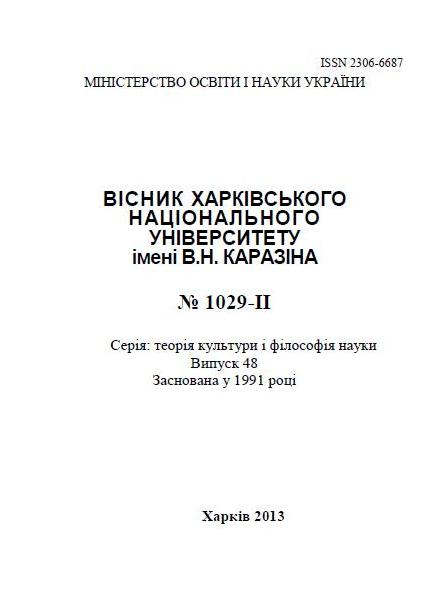ЭСХАТОЛОГИЧЕСКИЕ МОТИВЫ В ТВОРЧЕСТВЕ С.БУЛГАКОВА
Abstract
В статье «Эсхатологические мотивы в творчестве С.Булгакова»
рассматриваются вопросы, касающиеся соотношения тварного и божественного начал,
их специфической роли в окончательном сотворении мира. Автором проанализирована
природа Булгаковского понимания ада как закономерного следствия впадения тварной
свободы в произвол.
Шаповал Н.В. ЕСХАТОЛОГІЧНІ МОТИВИ У ТВОРЧОСТІ С. БУЛГАКОВА В
статті «Есхатологічні мотиви у творчості С. Булгакова» розглядаються
питання щодо співвідношення тварного і божественного начал, їх специфічної ролі в
остаточному створенні світу. Автором здійснений аналіз Булгаковського розуміння пекла
як закономірного наслідку перетворення тварної свободи у свавілля.
Ключові слова: вічність, тимчасовість, необхідність, тварна свобода, пекло.
Shapoval N.V. ESCHATOLOGICAL MOTIVES AT S. BULGAKOV’S CREATIVITY The
article «Eschatological motives at S. Bulgakov’s creativity» points out some questions,
connecting with the correlation between created and divine bases, theirs specific function in the
final creation of the universe. Author expounds an interrelationship between eternity and
temporary, as the last one is no other than eternity, stretching into the being and folding
nothingness by creative way. Eternity grounds temporary, it is transcendental against temporary
and needs nothing for itself. God as a creator of the universe present himself a presence eternity
in temporary. It was payed attention to “cooperation” between the Supreme Being and all
creation, while created liberty was assumed. The universe finds its final creation with matching
of created liberty and necessity, divine and human bases only. God willing doesn’t influence on
the universe mechanically but by creative way, always according to the decision and action of
created liberty for the best advantage of all creation. The creation is also the dispensation about
creatures, the Lord Almighty is the Sustainer too. It isn’t the dispensation of capricious and selfwilled
despot but a paternal unmercenary care. There is no pre-establishment in the world’s
activity or people’s lives. Created liberty chooses and actualizes one probability from its
indefinite variety. The Hand of the Sustainer is visible for ordinary person at the exclusive
moments and only the Saints and Enlighteneds realize the world as a consistent miracle.
Author also has reviewed the nature of Bulgakov’s comprehension of the hell as a natural
effect of created liberty, which felt into the arbitrariness. Aspect, which is concerning a hell as
potential but not obligatory ontological effect of the action of created liberty, is cleared out. Hell
grows from the no volition of the good and disagreement between real and subjective in the
human nature. Hell like an evil doesn’t have ontological existence. They are called the
hallucinations, naturally appearing in the perverted souls. As God had accepted human liberty
in corpora, it is indispensable to consider with all its outcomes even if they brings hellish
agonies. They are an opposite side of the liberty. God’s respect to the liberty declares itself just
in these agonies. No one may be saved by the forcible way. Therefore God’s forgiveness is not
enough for it, an availability to take the forgiveness is necessary too, it is called a repentance.
More over the hellish agonies aren’t applies on people but choose by themselves. So there is a
probability to overcome it with the same human self, who has given birth to it.
Key words: eternity, temporary, necessity, created liberty, hell.




